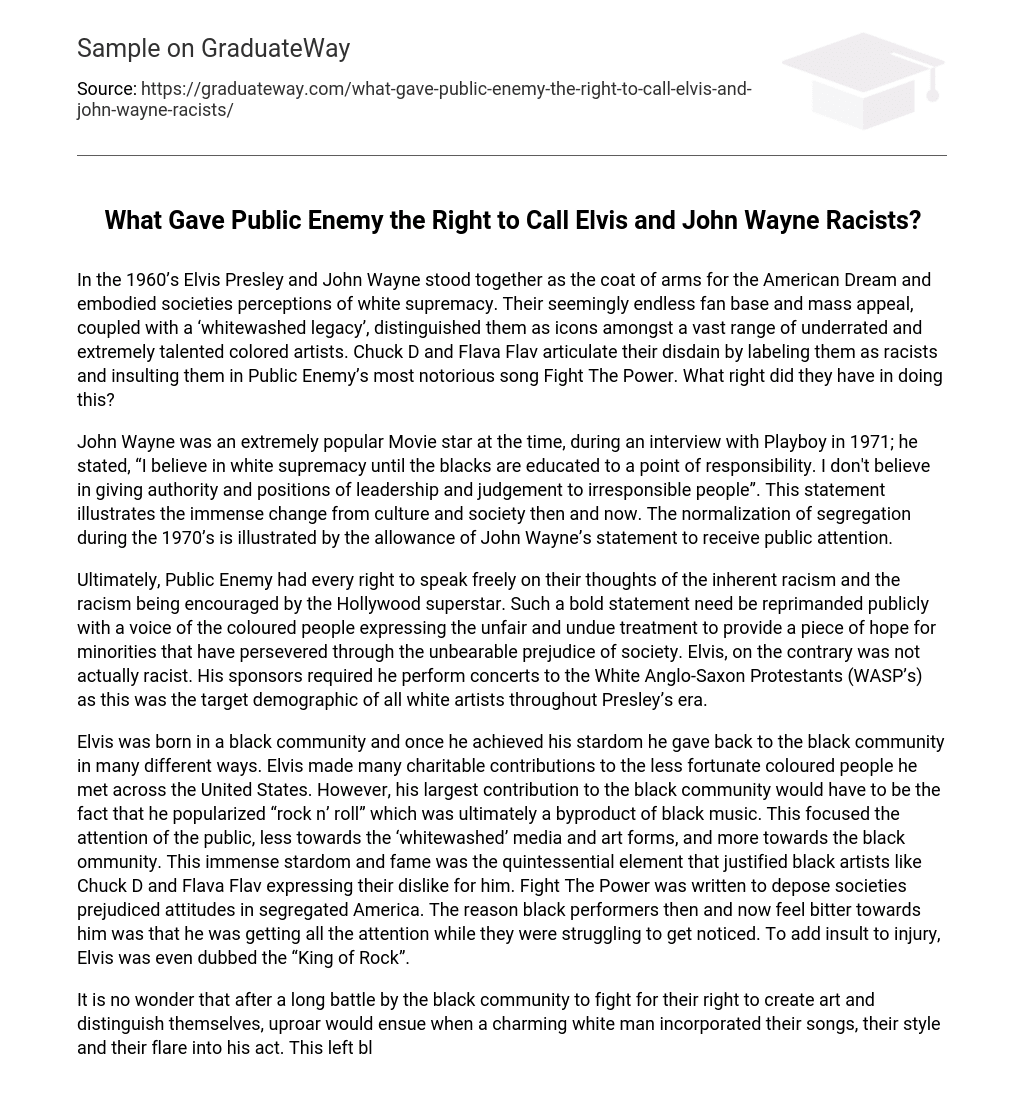In the 1960’s, Elvis Presley and John Wayne were seen as symbols of the American Dream and were believed to represent white supremacy. Despite their widespread popularity, many talented non-white artists were underrated in comparison to them. Public Enemy, through their song Fight The Power, criticized and insulted these two figures, accusing them of racism. This raises the question of whether Public Enemy had the right to do so.
During an interview with Playboy in 1971, the highly popular movie star John Wayne expressed his belief in white supremacy until black individuals were educated to be responsible. He also expressed his opposition to giving authority and leadership positions to irresponsible people. This statement highlights the significant cultural and societal shift that has occurred since then. It is indicative of the normalization of segregation during the 1970s, as evidenced by the public attention given to John Wayne’s remarks.
Public Enemy had the right to openly express their views on racism and the racism perpetuated by a popular Hollywood actor. It was important for people of color to publicly condemn such unfair treatment and offer hope to minorities who have faced societal prejudice. In contrast, Elvis was not personally racist. His sponsors insisted that he perform for the White Anglo-Saxon Protestant (WASP) audience, as it was the primary target demographic for white artists during his time.
Elvis was born in a black community and he gave back to the black community in many ways once he became famous. He made charitable contributions to less fortunate colored people he met across the United States. However, his biggest contribution to the black community was popularizing rock n’ roll, which originated from black music. This shifted public attention away from whitewashed media and art forms towards the black community. This immense fame justified black artists like Chuck D and Flava Flav expressing their dislike for him. They wrote Fight The Power to challenge society’s prejudiced attitudes in segregated America. Black performers then and now feel bitter towards him because he received all the attention while they struggled to get noticed. Additionally, Elvis was even called the “King of Rock”.
It is understandable that there would be uproar when a charming white man incorporated the songs, style, and flare of the black community into his act, considering the long battle fought by black artists to establish themselves and their art. This left black artists like Fats Domino, Chuck Berry, and Little Richard infuriated, as they received no recognition for their brilliant contributions in pioneering sounds and styles. Time and time again, it was frustrating for Public Enemy, black artists in America, and these pioneers to witness white artists gaining acceptance and popularity by appropriating styles from any group of color.
Elvis appropriated the tunes, rhythms, and performance style of black artists, surpassing the cultural recognition of the originals. Chuck D expressed his criticism of Elvis’s “whitewashed legacy,” arguing that Elvis’s status as the ‘King’ overshadowed the accomplishments of the black artists who had inspired him. Numerous black artists felt that Elvis unfairly achieved commercial success that was denied to their black peers in rock n’ roll.
Public Enemy had the right to express their outrage at the popularity and success of white individuals like Presley and Wayne, who embody the white American ideal and benefit from a discriminatory culture. This frustration stems from the fact that despite the contributions of black music and the black community to the development of rock and roll, a white man is crowned as the “King of Rock” and enjoys all the fame and wealth. Through their expression, Public Enemy condemns the inequality and unspoken barriers faced by the black community, asserting their justified right to address these issues.





